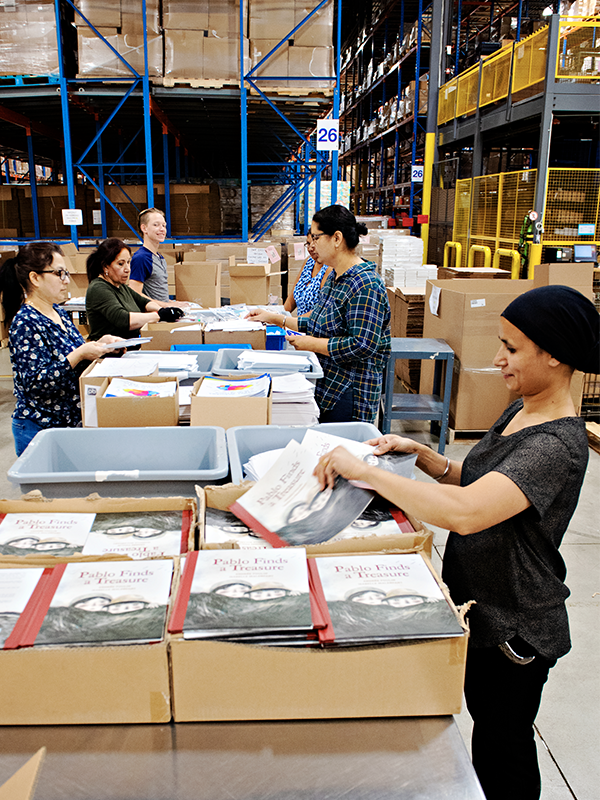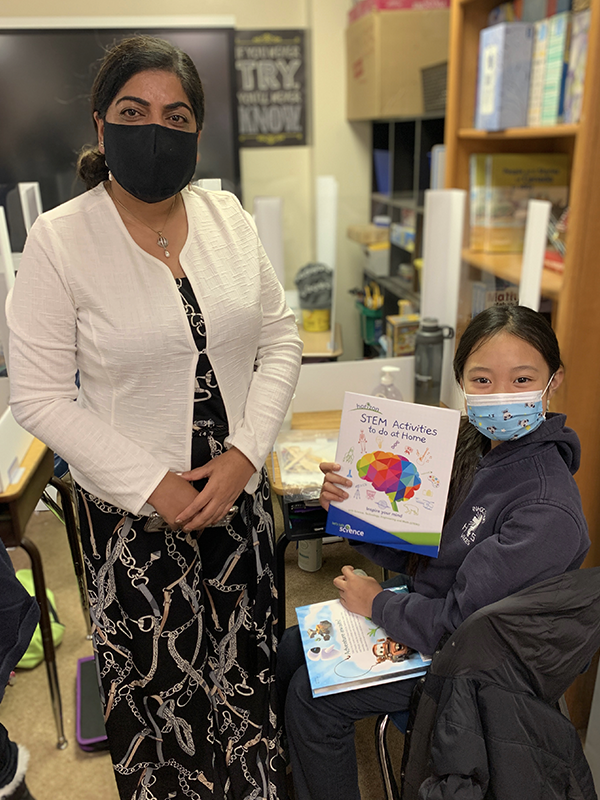Horizon Project - A Gift of Learning and Hope
When you’re living through a challenging time like the COVID-19 pandemic, it’s helpful to be able to see hope on the horizon. Let’s Talk Science launched the Horizon Project in 2020 to provide learning kits to children in Grades 4-6 across Canada who may have been left behind as the country transitioned to a largely digital learning experience.
Each Horizon kit included a colourful workbook with STEM and literacy activities, supplies to do the hands-on activities, an age-appropriate book, and more to keep children engaged. Canadian astronaut Chris Hadfield provided an inspiring message, and the material also included career spotlights, helping youth to think about the future.
The kits didn’t require computer technology, internet access or adult supervision – just imagination. They were distributed from August to November through food banks, Indigenous community groups, and other community partners in every province and territory.
Far too many children will remember the pandemic as the scariest time of their lives. That’s true for children in general, and those feelings can be especially acute in low socio-economic communities. There, the use of food banks has skyrocketed during COVID-19, and the lack of access to devices and the internet fostered isolation for many youth.
The Horizon Project didn’t aim to replace what children lost from school closures or deal with equity issues. Instead, the goal was something even more personal and fundamental: the idea that others care.
“We wanted to give the gift of learning from an unexpected source, and inspire hope,” says Dr. Bonnie Schmidt, President and Founder of Let’s Talk Science.
When Schmidt recognized how the pandemic was hitting children in vulnerable communities, she didn’t know precisely what Let’s Talk Science would do. But she did know this: “We had to do something.”
Partnering Together

The Horizon Project was an ambitious initiative, conducted in association with Food Banks Canada and ultimately involving nearly 300 organizations.
Everything had to be sourced, from more than 113,00 kilograms of learning resources, including 4.5 million beads used for “unplugged” coding activities, to the most basic supplies.
“The food banks told us we shouldn’t even count on the families having pencils around the house. And one of the biggest problems we had was sourcing tape,” says Schmidt.
Nothing was easy at a time when the pandemic had disrupted supply chains. Then there were the logistics related to assembling and shipping the kits.
The project distributed nearly 75,000 kits in English and French to youth aged 9-12, including more than 13,000 kits to Indigenous youth. The approach was a reminder that you don’t need tech to continue learning; you simply need to be inquisitive.
Inspiring Vulnerable Youth
“At this age, kids typically like going to school, they’re super curious, and they can work independently,” says Schmidt. “Science is a platform for asking questions about the world.”
While that’s true, children this age are also at a higher risk of disengaging. “We can’t afford to leave anyone behind,” says Schmidt. “The Horizon Project aims to send a caring signal to vulnerable youth that we believe in them and that learning is key for their future.”
The recipients were also encouraged to enter a draw to win one of more than 200 educational prizes. To enter (by using prepaid postage), they had to draw or write what interests them when they dream about the future or complete a Little Inventors challenge to design a solution that improves the health of our oceans.

As Schmidt notes, the pandemic has underscored the importance of science literacy and public trust in science. Let’s Talk Science promotes STEM learning, through the Horizon Project and everything else it does, fosters invaluable critical thinking, problem-solving and decision-making skills.
Collaboration Through Crisis
Along with the benefits for the recipients, the Horizon Project became an extensive friend-building opportunity for Let’s Talk Science. When searching for community organizations to distribute the kits locally in all jurisdictions, it was great to have every organization approached say yes. Horizon was a showcase of collaborating and innovating through a crisis.
Some key partners included Scholar’s Choice (provided supplies), First Book Canada and Rideau Hall Foundation (provided reading books), Mormark Printing and Fraser Direct (packaged the kits), Purolator (supported shipping), and Arctic Buying Company (shipping across the territories and northern Manitoba).
Ramping up the labour for the assembly during the pandemic was a particular challenge. “Fraser Direct said it was one of the most complicated projects they’ve taken on,” says Schmidt.
Early feedback from the children has been encouraging. The project hopes to inspire participating youth to dream about their futures. “They have it in themselves,” says Schmidt, but mainly to have fun exploring STEM.
This year was about validating the need, conceptualizing the project, pulling together so many community organizations that shared the vision, and distributing the kits. The full impact of Horizon will be measured in 2021.
In one sense, we might see the project’s ultimate success many years down the road. That’s when today’s children can look back on the pandemic time, and reflect on “at least one spotlight of positive energy,” says Schmidt.
But what the participants might feel then, they’re already thinking now, “Somebody was thinking about me.”